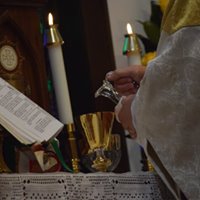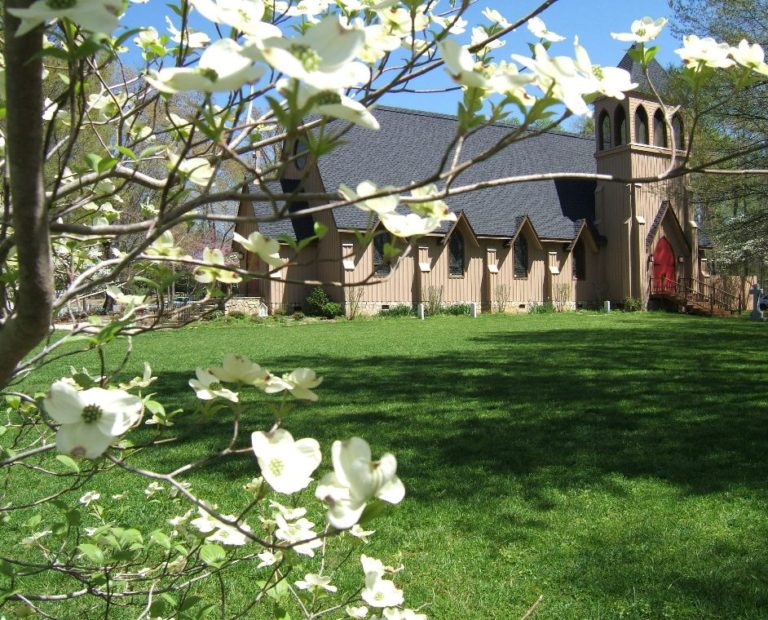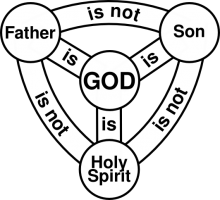
The Sacrament of Confirmation is the Sacrament of Christian maturity, the Sacrament which properly completes Baptism, making us full members of Christ’s Church. It conveys to the baptised Christian the Seal of the Holy Ghost, the fulness of the Holy Spirit in His Sevenfold Gift: wisdom, understanding, counsel, spiritual strength, knowledge, true godliness, holy fear (reverence) (see Isaiah 11.2-3 and BCP 296-299). This Sevenfold Gift enables us to know and believe the true Faith, and strengthens our souls and wills to resist temptation and lead lives of virtue and holiness. Confirmation, as the Seal of the Spirit, enables us to bear the fruits of the Holy Spirit. It makes us full members, full participants, in the Royal Priestly Body of Christ, the Church; anointed with holy chrism (blessed oil) we are thus Anointed Ones, ‘little Christs’ in the Anointed One Himself, the Christ, Jesus— enabled fully to share in the Perfect Sacrifice of Christ, which is the Holy Eucharist (Saint Cyril of Jerusalem). This Sacrament equips us with the fulness of the Spirit’s Gifts in order to strengthen us to serve Christ faithfully as soldiers of Christ in the Militia Christi. We are therefore empowered by Confirmation bravely and boldly to proclaim the Faith of Christ Crucified and to live according to the Catholic Religion. The term ‘Confirmation’ means ‘strengthening’ from the Latin word confirmare, ‘to strengthen.’ The Holy Ghost is the Comforter, the Strengthener (Saint John 16). This Sacrament of Strengthening communicates to us the Seven Gifts of the Holy Ghost so that we may authentically live adult Christian lives of holiness, consecration, and commitment to the Gospel.
It is administered by the bishop, who lays his hands upon the candidate and invokes the Holy Ghost to come and strengthen the person with His Gift. Confirmation is an extension, a continuation, of Pentecost, the descent of the Holy Spirit. It is a baptised Christian’s ‘personal Pentecost;’ the same Messianic Spirit who descended upon Our Lord and the Apostles now descends upon the baptised person sacramentally, ensuring by promise the gift of Himself. The Sacrament of Confirmation is of Apostolic origin, administered by the holy Apostles according to the commandment and desire of Jesus Christ. Although Our Lord did not directly institute this Sacrament, He intended the Holy Ghost to be communicated to baptized Christians at the hands of the Apostles and their successors, the bishops of the historic episcopate in Apostolic Succession.
Confirmation has always been practiced in the Church from the beginning and must be received in order for baptismal grace to be completed and perfected in the Christian soul: ‘Now when the Apostles at Jerusalem heard that Samaria had received the word of God, they sent to them Peter and John, who came down and prayed for them that they might receive the Holy Spirit; for He had not yet fallen on any of them, but they had only been baptised in the Name of the Lord Jesus. Then they laid hands on them and they received the Holy Spirit’ (Acts 8.14-16). ‘…the Spirit was given through the Apostles’ hands…’ (Acts 8.18). ‘Then they were baptised in the Name of the Lord Jesus. And when Paul had laid his hands on them, the Holy Ghost came on them’ (Acts 9.1-2). ‘The doctrine of baptisms, and of the laying on of hands’ (Hebrews 6.1-2) was essential to the primitive Church. In the ancient and undivided Church, the three Sacraments of Christian Initiation, that is, the three mysteries which together brought a person into the full life and communion of the Church – Baptism, Confirmation, first Holy Communion – were administered together as one rite, one act of entrance into the Church.
Over the course of time, in the Western Church, Confirmation, the completion of Baptism, was separated from Baptism as the regular ordinary minister of Baptism became the parish priest: in the West, Confirmation retained its link with the bishop in Apostolic Succession as its true and rightful minister, in order that all baptised Christians should have sacramental contact with the bishop and receive the ‘touch of Apostolic Succession,’ a direct grace given by Christ through the Apostles. Confirmation, as the Seal of the Spirit, is, for many Christians, the once-in-a-lifetime gift from God received directly and only from the bishop as the Successor of the Apostles, the High-Priest of the Church, and the chief Shepherd of the flock of Christ.
The Anglican Church restricts the administration of Confirmation to the bishop alone; in the Roman and Eastern Churches, a priest may confirm with the anointing of chrism which is blessed by a bishop. Anglicans seek to preserve the most biblical, ancient and venerable tradition, that of episcopal Confirmation. In our Province, a bishop may confirm the candidate not only with the laying-on-of-hands, the original and apostolic matter or physical act in the Sacrament, but also with the anointing of chrism, scented oil blessed by the bishop. For this reason, Confirmation is also called ‘Chrismation,’ or Anointing, especially in the Churches of the East; it is the same Sacrament by whatever name.
Like Baptism, remember that Confirmation conveys an indelible spiritual mark on the soul, a sacramental character, which lasts for ever and can never be repeated. Just as a person can receive the Spirit for the forgiveness of sins and regeneration in order to be born again only once, so a baptised Christian can only receive the fulness of the Holy Spirit once for eternity. Confirmation gives us a unique and special quality in that it makes us sharers in the Royal Priesthood of Christ, and it unites and conforms us to Christ the Anointed One in a unique way never to be removed, erased or repeated. It puts us into a relationship with Christ the Priest, and with the Holy Ghost, the Strengthener, which can never be re-established once achieved. We are confirmed only once.
Although we renew our baptismal vows in the liturgy of Confirmation in the Book of Common Prayer, such reaffirmation is technically not a part of the actual Sacrament of Confirmation. Yes, we should re-profess the vows which we made at our Baptism, or which were made for us as children, making them our own again, and we should reaffirm our faith in Jesus Christ, again renouncing the world, the flesh and the devil: Confirmation is the most crucial period in a Christian’s life in which this may be done. So, the Prayer Book provides for this to be done. It is an excellent idea, and, for most of us baptised as children, it is fundamental to our personal experience of professing and living the Christian Faith.
But even so, the Sacrament does not directly depend on this very good and edifying practice; it is not necessary for the Sacrament to be valid. Confirmation is the ‘key and door to the Altar,’ making us eligible to receive the Most Blessed Body and Blood of Christ in the Holy Communion. Only those who have received this Sacrament, or who desire to receive it, may receive the Blessed Sacrament— this is because we are made full members of the Church only by Confirmation, full sharers in the Priesthood of the Body, and thus sharers in its One Sacrifice, the Holy Sacrifice of the Mass.






